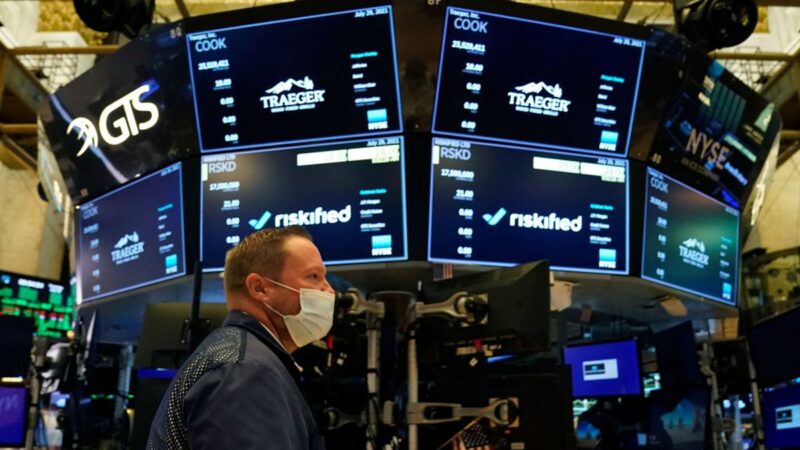[NTD News, August 21, 2021, Beijing time]As the United States tightens supervision, Beijing is also severely suppressing Chinese Internet companies. Under internal and external attacks, China concept stocks continued to plummet, and their market value evaporated nearly US$1.5 trillion. Experts warn that the stock market has fallen deep and there is no bottom yet, and Chinese technology stocks are expected to suffer more.
The U.S. House of Representatives passed a law in December last year stating that if Chinese companies fail to fully comply with U.S. financial auditing rules, they will be kicked out of the U.S. stock exchange.
The Chairman of the US Securities and Exchange Commission (SEC) Gary. Gary Gensler said a few days ago that he has asked SEC staff to “temporarily stop” using the initial public offering (IPO) of backdoor listed companies.
He warned in a video released on August 16 that many investors did not understand the risks of Chinese stocks listed in the United States. “When you think you are investing in a Chinese company, you are actually investing in a shell company in the Cayman Islands or other parts of the world.”
Gensler also asked his subordinates to provide investors with complete and fair information about Chinese companies listed in the United States.
“This means that the disclosure of political and regulatory risks, the Chinese (communist) government may, as it has done many times recently, drastically change the rules in the game.” Gensler said.
A person familiar with the matter said that “regulators also require the disclosure of more information about China’s political and regulatory risks.” Newly listed Chinese companies may face more than 20 regulatory issues including cash flow, taxation, and policy risks.
Guo Yafu, head of Tianjiao Asset Management Company, said that checking cash flow is mainly for tax purposes, which is relatively easy to do. “The most difficult thing is that the company has to disclose how much the Chinese government’s policy risk is for you, and it has to explain clearly what policy changes the Chinese government has made.”
Nickolas Consonery, executive director of the Eurasian Group Management Office, told VOA that Beijing’s tightening of China’s technology and Internet industry regulation is intensifying, “This is what really brings this kind of attention to a higher level in the United States. The reason, this is where the real change is taking place.”
The CCP authorities have recently suppressed Chinese technology companies such as Alibaba and Didi Chuxing for reasons such as antitrust and Internet information security. Subsequently, regulators suppressed off-campus training institutions, causing the market value of related stocks to evaporate billions of dollars.
On August 17, the General Secretary of the Communist Party of China Xi Jinping proposed for the first time the so-called “common prosperity” policy, which requires “regulation” of high-income groups and enterprises and asking them to “repay more to society.” On that day, China’s A-shares and Hong Kong stocks plunged, and the stocks of Alibaba and other Internet companies fell to new lows.
Chinese concept stocks evaporate 1.5 trillion US dollars
The Voice of America reported that the above factors have caused China’s concept stocks to face longer-term shorts and sell-offs.
The Nasdaq Golden Dragon China Index (PGJ), which tracks nearly a hundred Chinese stocks listed in the United States, fell for the sixth consecutive day on the 17th. The index fell to less than US$41 from its highest point of US$84 in February this year, and the value of the China Approximate stock market has evaporated by more than US$750 billion.
“For American investors, Chinese stocks are becoming an asset they shouldn’t own.” Bloomberg reported that about 16% of respondents said that “Chinese policy” is currently the biggest risk, ranking second only to inflation. , Reduce panic, Covid-19 and asset bubbles.
Kang Senrui, executive director of the Eurasia Group Management Office, said, “I think there is no doubt that it (the situation of China Concept Stocks) will only become more difficult.”
On August 21, Bloomberg quoted Alex Au, the managing director of Alphalex Capital Management in Hong Kong, as saying: “I don’t think the sell-off will end soon. Investors need to reassess the reasons and risks of investing in China.”
He sold all of his holdings of Chinese technology stocks last month and increased his short position in the sector a week or two ago.
According to the report, since the February high, the four companies that have lost the most market value in the world are Chinese technology companies. The total market value of Tencent, Alibaba, Kuaishou, and Meituan has evaporated by more than $1 trillion. The Hang Seng Index also plummeted by more than 40%, witnessing nearly US$1.5 trillion in market value evaporating.
Sean Tayloy, Chief Investment Officer and Head of Emerging Markets Equity at Deutsche Asset Management (DWS), believes that given the uncertainty of the CCP’s supervision, it is difficult to say that the current technology stocks have fallen to the end. “We don’t know where the bottom is.”
(Reporter Luo Tingting Comprehensive Report / Chief Editor: Wen Hui)
The URL of this article: https://www.ntdtv.com/gb/2021/08/21/a103195990.html
